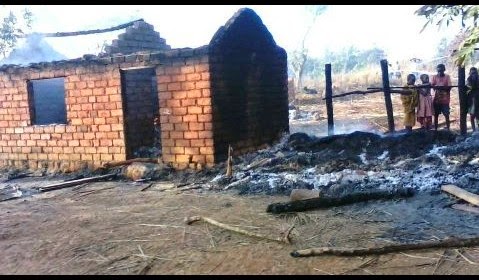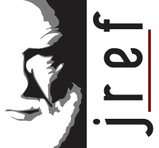Seven villagers of Murufiti in western Tanzania were murdered last week. The media reported the arrests of 23 people charged with the murders, which was how the crimes came to international attention.
Witnesses report that the victims were suspected to be witches and were attacked with machetes and their homes burned.
The elderly, albinos and even children have been attacked and often killed in the name of witchcraft in Africa as the belief in occult powers remains strong. What can be done?
Researcher and activist Leo Igwe reports to the JREF on the governmental response to such atrocities.
Witnesses report that the victims were suspected to be witches and were attacked with machetes and their homes burned.
The elderly, albinos and even children have been attacked and often killed in the name of witchcraft in Africa as the belief in occult powers remains strong. What can be done?
Researcher and activist Leo Igwe reports to the JREF on the governmental response to such atrocities.
By Leo Igwe
For too long, the approach to combating witch persecution and killing in Africa has been reactive. This strategy has largely proved ineffective in eradicating this cultural scourge. Africa has remained one of the hotspots of contemporary witch-hunts in the world.
To date, the approach to tackling witch persecution in the region is this: whenever there is a reported case of witch killing, governments (in some cases) launch a police investigation, make arrests, prosecute and sometimes jail those convicted. After a time, the matter fades away. Governments return to business as usual and eventually, another case of witch killing occurs. This is not how to root out and solve this problem. Is it?
For non-governmental organizations, the response is similar. They issue a statement condemning such an atrocious act or express concerns over the violation of the human rights of alleged witches and urge the government to take necessary measures to address it. Then, nothing is heard about the issue until another ‘witch’ is attacked or killed.
This fire-fighting, knee-jerk approach must stop. We cannot eradicate witch-hunts in Africa with such a lackluster strategy.
In Tanzania, twenty-three people have been charged with murdering seven persons on the suspicion that they were witches. The seven alleged witches were murdered in a village in Western Kigoma region. Police in Tanzania have made similar arrests in the past following cases of lynching of alleged witches or the killing of people living with albinism. But it is clear that this measure has not brought to an end to this practice. We need to rethink our strategy and devise new ways of tackling this phenomenon.
For too long, the approach to combating witch persecution and killing in Africa has been reactive. This strategy has largely proved ineffective in eradicating this cultural scourge. Africa has remained one of the hotspots of contemporary witch-hunts in the world.
To date, the approach to tackling witch persecution in the region is this: whenever there is a reported case of witch killing, governments (in some cases) launch a police investigation, make arrests, prosecute and sometimes jail those convicted. After a time, the matter fades away. Governments return to business as usual and eventually, another case of witch killing occurs. This is not how to root out and solve this problem. Is it?
For non-governmental organizations, the response is similar. They issue a statement condemning such an atrocious act or express concerns over the violation of the human rights of alleged witches and urge the government to take necessary measures to address it. Then, nothing is heard about the issue until another ‘witch’ is attacked or killed.
This fire-fighting, knee-jerk approach must stop. We cannot eradicate witch-hunts in Africa with such a lackluster strategy.
In Tanzania, twenty-three people have been charged with murdering seven persons on the suspicion that they were witches. The seven alleged witches were murdered in a village in Western Kigoma region. Police in Tanzania have made similar arrests in the past following cases of lynching of alleged witches or the killing of people living with albinism. But it is clear that this measure has not brought to an end to this practice. We need to rethink our strategy and devise new ways of tackling this phenomenon.
Witch persecution and killing continues in other parts of Africa as belief in witchcraft persists, especially among the population in Tanzania. A local human rights group says at least 500 alleged witches are murdered in Tanzania every year. In my opinion, this statistic is an understatement. Arresting and prosecuting of witch killers is a welcome development. Imprisoning witch killers can serve as deterrence. But, for witch killing to stop, belief in witchcraft must be abandoned, the illogic must be exposed.
The killing of a witch is the end of a murderous process that starts in the mind. Witchcraft has to do with people’s cosmological notions and a people’s mentality. Changing attitudes and mentality takes great time and effort. Legislation is not enough, enforcement has to go in hand with mental and cultural reorientation.
The government of Tanzania must review its current strategy and adopt a more proactive approach. Apart from making arrests, prosecuting and jailing those convicted of killing alleged witches, the government of Tanzania should put in place programs aimed at reorienting the minds of the people. This public enlightenment campaign should address the reasons why people suspect others of witchcraft and get them to abandon this historic superstition. Dismissing and denouncing witchcraft as nonsense is not enough.
We need to understand why the imaginary evil of witchcraft is so real to some people to the extent that they can kill and maim suspected witches as well as poisoning family and community relations.
The government should encourage skepticism, rationality and critical thinking in all areas of human endeavor. Be they students or teachers, taxi drivers or market men and women, technocrats or artisans - the value of critical examination of issues and questioning of magical narratives that fuel suspicions and accusations of witchcraft should be encouraged in society.
Anti-witchcraft program should be included in the school curriculum. From an early age, young Tanzanians should be taught to question traditions and demand evidence for extraordinary claims. They should be made to understand the fallacies in witchcraft belief. Tanzanians need to know that people entertain witchcraft notions due to fear of the unknown and fear of the inexplicable, that suspicion of witchcraft is due to ignorance of nature. Grassroots educational program may enable people to understand and address their fears and make sense of their misfortune without invoking the idiom of witchcraft.
The misconception that witchcraft is African “science” has to be corrected. Scientists, skeptics and rationalists in the country should adopt a more proactive approach.
The government should address traditional healing practices and the sanctioning of healers who mix magic and medicine including faith healers of all types - traditional, Christian and Islamic.
The task of reorienting the mindset of the people must begin immediately. We should not stand by and wait for another “witch” to be killed before putting in place an effective public enlightenment campaign. Witch hunting must stop. Let us join together to make witch hunting history for future generations.
The killing of a witch is the end of a murderous process that starts in the mind. Witchcraft has to do with people’s cosmological notions and a people’s mentality. Changing attitudes and mentality takes great time and effort. Legislation is not enough, enforcement has to go in hand with mental and cultural reorientation.
The government of Tanzania must review its current strategy and adopt a more proactive approach. Apart from making arrests, prosecuting and jailing those convicted of killing alleged witches, the government of Tanzania should put in place programs aimed at reorienting the minds of the people. This public enlightenment campaign should address the reasons why people suspect others of witchcraft and get them to abandon this historic superstition. Dismissing and denouncing witchcraft as nonsense is not enough.
We need to understand why the imaginary evil of witchcraft is so real to some people to the extent that they can kill and maim suspected witches as well as poisoning family and community relations.
The government should encourage skepticism, rationality and critical thinking in all areas of human endeavor. Be they students or teachers, taxi drivers or market men and women, technocrats or artisans - the value of critical examination of issues and questioning of magical narratives that fuel suspicions and accusations of witchcraft should be encouraged in society.
Anti-witchcraft program should be included in the school curriculum. From an early age, young Tanzanians should be taught to question traditions and demand evidence for extraordinary claims. They should be made to understand the fallacies in witchcraft belief. Tanzanians need to know that people entertain witchcraft notions due to fear of the unknown and fear of the inexplicable, that suspicion of witchcraft is due to ignorance of nature. Grassroots educational program may enable people to understand and address their fears and make sense of their misfortune without invoking the idiom of witchcraft.
The misconception that witchcraft is African “science” has to be corrected. Scientists, skeptics and rationalists in the country should adopt a more proactive approach.
The government should address traditional healing practices and the sanctioning of healers who mix magic and medicine including faith healers of all types - traditional, Christian and Islamic.
The task of reorienting the mindset of the people must begin immediately. We should not stand by and wait for another “witch” to be killed before putting in place an effective public enlightenment campaign. Witch hunting must stop. Let us join together to make witch hunting history for future generations.
African girls and women accused of witchcraft
Leo Igwe is a skeptical activist in Nigeria and a former representative of the International Humanist and Ethical Union. He partners with the JREF to respond to and publicize the superstitious beliefs about witchcraft throughout Africa.



